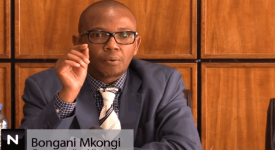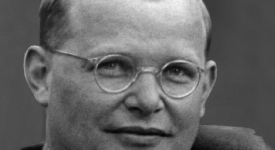Jesus of Lubeck is the name of the ship you see here. Of course, it is named after the famous Jesus of Nazareth, whom millions variously refer to as “Son of God,” “Messiah,” “King of Kings,” “Lord of Lords,” “Lamb of God,” etc. But to the millions of souls whose future fate were soon to be determined as soon as their feet stepped on this ship, the name ‘Jesus’ was a nightmare, a piece of agony from hell (without flames), unleashed on black mortals. Inside this ship, children, women, and men would see Satan’s jaws, and his white teeth, smiling at them in the name of the English economic capital.
To know the role the (King James) Bible played in shaping the identity of the people of Great Britain, and beyond, again, compels us to recognize why giving a slave ship the name of one who was at the same time revered, worshiped, and war-shipped, creeps in the enslaving economy any totalizing worldviews–identifiable within community or national landscapes of scriptural dynamics. Imagine having a popular clothing label; or, in fact, traveling first- class! Jesus of Lubeck was simply a most ingenious calculation of the white slave-making business; the matter of economic marketability was much guaranteed.
Slavery and racism proceed only from hearts of darkness. Whereas slavery is often associated with premodern societies; racism continues to indwell postrace American individual in frighteningly morbid proportions. In the United States today both slavery and racism are contemporary tropes drooping live in social, political and public spheres. It also seems as though the United States has been an island of her own making up until she was being forced to open up, to examine herself, to address the near unsayable legacies in which she is adept: pervasively repressed contradictions embodied in this modernized exemplary empire.
Hence, in American social and political orders, slavery and racism are economic wares that profits the culturally established, or like every other other major tribe, the “dominant social category.”
In retrospect, there might be “legitimate” factors which necessitated the historical label of Africa as being the ‘dark continent’; if only because early European explorers were unschooled, being total idiots in cultures African and their autochthonous science of survival; moreover, European deities, which spoke through, by, and from books were temporarily muted as a result of new symbolic languages for which ‘white’ divination could not find any interpretative framework to gain vindication! Hence, as soon as they spoke, as had done their Arab deity long before them, Africa, or any other such contact, was doomed upon impact, as these “two elephants” had found cage for their royal gamble.
The gamble is still on. The stakes have become higher than initially presumed. So on Saturday November the 30th, 2013, the Heritage Ministry at Trinity African American Episcopal (AME) Church located at 604 Lynhurst Dr SW, Atlanta, GA 3031, organized its first “Heritage” program. According to an email communication, “this ministry is designed to inform our congregants about the history of the African American People. It is important for our congregation to be well informed of their past.”
Anyone who does not bear the black burden, the individualized self, which, in the United States, has refused to put on the reading and writing lenses of what Toni Morrison describes in Playing in Dark as the “risk and safety, the serene achievement of, or sweaty fight for, meaning and response-ability,” could never fathom, as the black self doubly, simultaneously locked, first in the freed African, and beginning recently, in the struggling American, does.
Dr. Henry Love Whelchel, professor of African American Church History at the Interdenominational Theological Center (ITC), was one of the two guest speakers. Dr. Whelchel knows his onion definitely. Bit by bit, and systematically, he takes the audience through an incriminating history of American whiteness. (You would have pitied what is called American!) You might almost think that this senior teacher was taking it too far; maybe he is being unfair to the system called America. The second speaker, David Olali, the T’Ofori-Atta Research Fellow in Global Leadership, also at the ITC, a position created under the leadership of ITC’s former president, Dr. Ronald Edward Peters, to recover and continues the legacies, research and ideas that are pertinent to, and referred under the freight “African Heritage;” actually the establishment of the position also coincided with an attempt at institutional resurrection or recovery. Dr. Peters, like the founder of the Religious Heritage of the African World (RHAW), renamed T’Ofori-Atta Institute, is a practical aficionado of Africa and African value systems. It therefore was no surprise that he would seek to continue the legacies of one with whom he had ‘seen’ Motherland in various shapes and forms.
Coming from a comparative African and African American perspective Olali notes the use of heritage for different agendas, including the othering of black communities in the United States; the de-othering of black tribes and ethnicities, as well as the denominationalization of black selves. Africa becomes the minefield for such multi-agenda engendered excavations.
The event concluded with ‘heated’ and serious participation by the audience which gave inputs and new ways of thinking forward. One participant explained: I think what Olali is saying is that we must begin to reexamine our strategies and rhetoric about American racism because its [racism and racism’s] strategies are changing and becoming more subtle every time we think we have been able to fully identify it. His interpretation was correct, American brand of ethnicism, racially disguised, is a thief which, under the present scheme of things, no black individual can permanently and continually catch red-handed. It is a crafty and highly prudential, and well-sculpted, educated American evil. Gone are those days when America’s race question was totally formed under color lines. Today, a black person discriminates against another black person because the latter is from Africa, or because they are uniquely accented.
As observed by both speakers and participants during the recent forum mentioned above, racism is alive, well and it is an English word. (More about this English ‘invention’ in another article.) And one thriving example of racism, no, it is slavery, not racism, in twenty-first century’s thirteenth year, is found in America’s justice system. The reason, according to Douglas A. Blackmon, why we do not know it is slavery is because is by another name.
John Hawkins of Plymouth, one of the architects of the improved Elizabethan navy and whose slave trading career was thought to have ended in 1567, recently resurrected and resumed duty in 61-year old Mark Ciavarella Jr., a former President Judge in Luzerne County, the largest county in northeastern Pennsylvania. The honorable judge received sentencing nearing 30 years in prison for engaging in selling human beings in civilized America, an exclusive crime for which he had no juvenile competitor, for cash. A article in the Huffington Post reports that the white American judge “filled the beds of the private lockups with children as young as 10, many of them first-time offenders convicted of petty theft and other minor crimes.”
Evidence show that his mercantile judgments yielded “more than $1 million.” And so for $1,000,000 (American dollars, a longstanding judge was willing to go to jail)!
 This returns us to Chinua Achebe’s justifiably harsh criticisms of that white and Polish ‘hero’, Joseph Conrad, who was inscribed into English society by Christian letter. It is true as the West African proverb goes that the individual who does not remember where and when it started raining on them will not know when they arrived their final destination. So Achebe, knowing where the “rains” started pouring down on Africa, through his 1958 novel, Things Fall Apart, excoriated the colonialist’s othering representations of Africa and Africans was, plainly imperialistic, prejudiced and unacceptable. In the 1970’s, the attraction which he had had in his younger days for Joseph Conrad’s seductive writing via the novella, Heart of Darkness, turned sour; an enlightened and critical reading of a white literary masterpiece left in the renowned African author bitter tastes of enslavement. It was as if Achebe was a direct and biological brother of Olaudah Equiano (c. 1745 – 31 March 1797), the 11-year old African boy stolen by white Christians, and who later in life re-christened as Gustavus Vassa, to fit into British system of authenticity. In Vincent Wimbush’s White Men’s Magic: Scripturalization as Slavery, this latent authenticity game came to real life, a whitened holography.
This returns us to Chinua Achebe’s justifiably harsh criticisms of that white and Polish ‘hero’, Joseph Conrad, who was inscribed into English society by Christian letter. It is true as the West African proverb goes that the individual who does not remember where and when it started raining on them will not know when they arrived their final destination. So Achebe, knowing where the “rains” started pouring down on Africa, through his 1958 novel, Things Fall Apart, excoriated the colonialist’s othering representations of Africa and Africans was, plainly imperialistic, prejudiced and unacceptable. In the 1970’s, the attraction which he had had in his younger days for Joseph Conrad’s seductive writing via the novella, Heart of Darkness, turned sour; an enlightened and critical reading of a white literary masterpiece left in the renowned African author bitter tastes of enslavement. It was as if Achebe was a direct and biological brother of Olaudah Equiano (c. 1745 – 31 March 1797), the 11-year old African boy stolen by white Christians, and who later in life re-christened as Gustavus Vassa, to fit into British system of authenticity. In Vincent Wimbush’s White Men’s Magic: Scripturalization as Slavery, this latent authenticity game came to real life, a whitened holography.
We are often wont to presume that terms such as “barbaric,” “primitive,” “uncivil,” or even “satanic,” are common labels for those societies, particularly societies which westerners, and some others, consider improbable to be on the same developmental radar as those deemed “first in everything” noble, civilized. Such thinking makes it easy to reach the conclusion that eighteenth century England was archaic society, and to justify the social and economic needs which birthed commercial and industrialized slave trades in the first instance. Still we would refuse to find the connection in a former President Judge in the United States who sells children as young as 10 for profit with the practice of stealing children, mass-murdering peoples and cultures in Africa under the banner of Christian enlightenment campaign or Islamic jihad–all for God and to profit God-possessors.
Judge Ciavarella Jr. wrongfully convicted and sent thousands of children to detention centers from which he benefited financially. The enormity of his evils was announced when the Pennsylvania Supreme Court nullified about 4,000 convictions which had been issued by Ciavarella between 2003 and 2008. The judge is the proud heir of a profoundly uninspiring legacy of juvenile constitutional rights’ violations. He was notorious for denying juveniles their constitutional rights to intelligently enter a plea, or right to legal representation. His preemptive juridical had multiple fatal juvenile victims. Yet there is hardly anything strange about this former President Judge in the State of Pennsylvania, in Luzerne County.
The mortal judge continues to believe that his verdicts were well informed. Like the Portuguese, and later British explorers, he remained assured of his safety, and ultimately his salvation by way of vindication. The judge is unable to look in the rear view of his race mirror, to locate where the ship in which he sailed has gone adrift, out of the map of Morrison’s “response-ability.” He will not be able to because the system, clogged by color, libeled (race) race, does not permit self-darkening. The innocent judge would be have been in contradiction of the system were he to find himself in that unpleasant position of seeing himself in the shoes of the others whom he helped create–not in his own image.
In the twenty-first century, slavery has changed its color. Slaves are not in physical chains. Instead, we are bound by corporate chains of credit card debts, poor/low (or no) incomes, destructive relationships, cheap hard drugs, homelessness, demons of materiality, and arms. Educating our communities, the surest paths to liberation, is progressively becoming impossible, with the close down of schools, and the multiplication of prison rooms, which is good business for the like of Judge Ciavarella.

Finally, we will need to know if there are ways of freeing ourselves from these shackles of contemporary enslavement? Is there any hope that our community leaders– social and activists, preachers, atheists– who represent our causes will rise to the emerging occasion and help expansively redefine slavery? How can we help our leaders to help us install much-needed change?
Let us hear from you…
Updated: 09/16/2016








